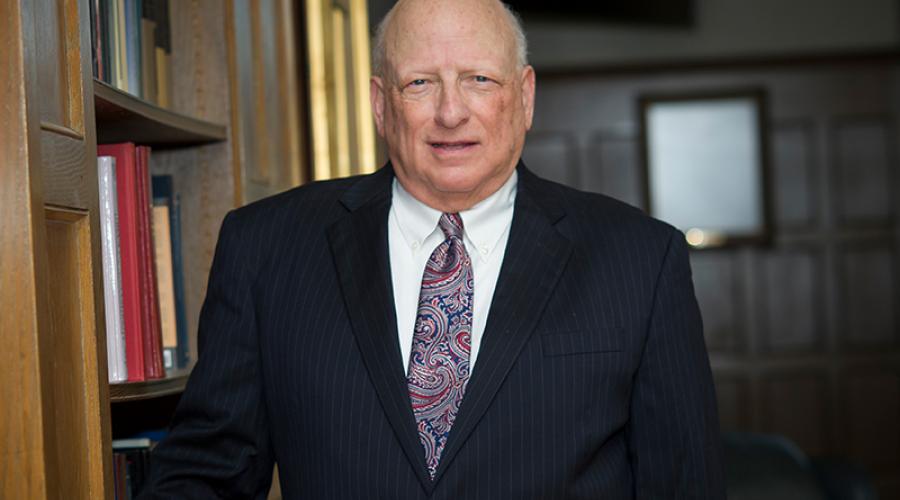
Lipsky's Legacy
David Lipsky was in his third year of graduate school at MIT when he taught his first class ever – labor relations – to engineering students.
"I was bloody awful. I had no training or preparation to teach."
Five decades later, he has been selected for Cornell’s top undergraduate teaching award, the Stephen H. Weiss Fellowship.
"Boy, it took a long, long time before I thought I could teach, and I'm still working on it. It was a good 10 or 15 years before I thought maybe I'm hitting some goals, and I still struggle. You don’t ever really master anything."
Lipsky transferred to Cornell after his freshman year at Lehigh University and graduated from ILR in 1961. He returned in 1969 to teach and is now the Anne Evans Estabrook Professor of Dispute Resolution.
"I've always identified with ILR students. I remember a lot about what it was like to be a Cornell undergraduate … what I appreciated and what I didn't appreciate. I also remember the ILR faculty who helped me and inspired me."
Professor Maurice Neufeld, who taught Lipsky when he was an ILR undergraduate, set a tone of accessibility Lipsky emulates. "You could talk to Maurice, and Maurice wanted to talk to you. He was friendly and he was helpful."
"I enjoy talking to students and Maurice always did. Maurice would stop in the hallway and talk with me and other students and say, 'Let's go to the Ivy Room and have a cup of coffee.' Gee, that was amazing. One of the founders of the ILR School and he wants to have a cup of coffee with me?"
One of Lipsky's classroom techniques is teaching concepts through personal stories.
Many are humorous and reference Sandy Lipsky, with whom he celebrated 50 years of marriage last June.
They met in high school in their hometown, Bethlehem Pa., where Lipsky grew up selling shirts and ties in his father's store, Ray's Men's Shop.
"I waited on customers, it was a major part of my education. My father was a good tutor … the way you sold was being of maximum service to the customer ... Those were formative experiences that carried over and served me well."
"There is a kind of connection between being in the retail business, dealing with customers, and then dealing with students. That relationship is so important."
A keeper of legendarily long office hours that can run from 3:30 to 8 p.m., Lipsky has cultivated the art of listening.
"I do enjoy helping students. I get some vicarious satisfaction when it all works out," Lipsky said, referring to advice he is asked for on a daily basis about internships, course selections and careers.
Lipsky fondly remembers the encouragement he received as a student from labor economist Robert Aronson, now ILR professor emeritus. "Bob inspired me to study economics in grad school and recommended that I apply to MIT."
When today's ILR students are selecting their life's work, Lipsky encourages them to look beyond material reward and toward intrinsic satisfaction.
He challenges them to a litmus test: "Do you find this personally satisfying without anyone ever patting you on the head? If you don't, it's not a recipe for happiness."
After teaching for 46 years, Lipsky says he can’t imagine leaving his profession.
"It's sort of nice when the work that you're doing becomes more like a hobby than work. I have a choice. I can retire. I’m at a stage I can pick and choose what I want to do."
What he wants to do is continue teaching and researching. Every year, Lipsky produces and presents several academic papers, often with ILR graduate students or former Ph.D. students who have gone into teaching careers at other universities.
Considered one of Cornell's most memorable professors, Lipsky remembers his students, such as the collective bargaining class student mature beyond his 20 years.
Lipsky remembers thinking, "Who is this character? He was so perceptive, engaged. He bowled me over with his intuitive insight about the topic."
Marty Scheinman has gone on to become one of the nation's leading mediators and arbitrators.
He and his wife, Laurie Scheinman, established the Scheinman Institute on Conflict Resolution. Lipsky, ILR's dean from 1988 to 1997, is the institute's director.
More than 100 former students emailed him when they learned of the Weiss award.
"I was humbled," said Lipsky, a fan of movies, crewneck sweaters and the Philadelphia Phillies.
"I wanted to find something that would be satisfying and worthwhile and fulfilling. I didn't want to be in retail. I remember my father struggling with the store, worrying all the time. I thought, 'There are actually people who get paid to be in a classroom, read books, all the things I like?'"
"You should love what you do."